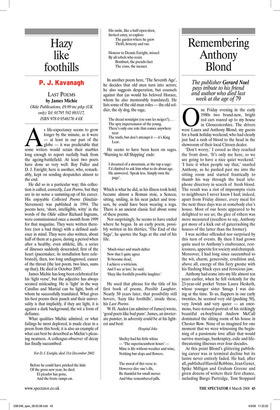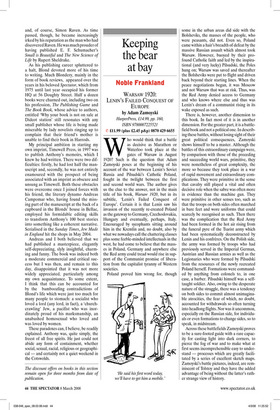Remembering Anthony Blond
The publisher Gerard Noel pays tribute to his friend and author who died last week at the age of 79
One Friday evening in the early 1980s two brand-new, bright red cars roared up to my house in Gloucestershire. The drivers were Laura and Anthony Blond, my guests for a bank holiday weekend, who had clearly just had a rush of blood to the head in the showroom of their local Citroen dealer.
‘Don’t worry,’ I cooed as they reached the front door, ‘It’s only me here, so we are going to have a nice quiet weekend.’ ‘I hate it when people say that,’ snarled Anthony, as he pushed past me into the sitting room and started frantically to thumb his way through the local telephone directory in search of fresh blood. The result was a riot of impromptu visits to neighbours I never knew I had; indeed, apart from Friday dinner, every meal for the next three days was at somebody else’s house. Most of our hosts appeared to be delighted to see us; the glee of others was more measured (needless to say, Anthony got more of a kick out of gatecrashing the houses of the latter than the former).
I was neither offended nor surprised by this turn of events. By then I had grown quite used to Anthony’s exuberance, restlessness, appetite for society and chutzpah. Moreover, I had long since succumbed to the wit, charm, generosity, erudition and, above all, energy of this fiery gnome with his flashing black eyes and ferocious jaw.
Anthony had come into my life almost ten years earlier, when he fell violently for the 23-year-old pocket Venus Laura Hesketh, whose younger sister Smugs I was dating at the time. To us, flappers in our early twenties, he seemed very old (pushing 50), very Jewish and very queer — an enormous, bare-torsoed portrait of his strikingly beautiful ex-boyfriend Andrew McCall dominated the sitting room of his house in Chester Row. None of us imagined for one moment that we were witnessing the beginning of a passionate love affair that would survive marriage, bankruptcy, exile and lifethreatening illnesses over four decades.
At this point Blond’s glittering publishing career was in terminal decline but its lustre never entirely faded. He had, after all, published Harold Robbins, Jean Genet, Spike Milligan and Graham Greene and given dozens of writers their first chance, including Burgo Partridge, Tom Stoppard and, of course, Simon Raven. As time passed, though, he became increasingly irked by his reputation as the man who had discovered Raven. He was much prouder of having published E. F. Schumacher’s Small is Beautiful and The New Science of Life by Rupert Sheldrake.
As his publishing career spluttered to a halt, Blond devoted more of his time to writing. Much Blondery, mainly in the form of book reviews, appeared over the years in his beloved Spectator, which from 1975 until last year occupied his former HQ at 56 Doughty Street. Half a dozen books were churned out, including two on his profession, The Publishing Game and The Book Book, whose advice to authors, entitled ‘Why your book is not on sale at Didcot station’ still resonates with any small publisher whose life is being made miserable by lady novelists ringing up to complain that their friend’s mother is unable to find their book in Harrods.
My principal ambition in starting my own imprint, Timewell Press, in 1997 was to publish Anthony’s memoirs, which I knew he had written. There were two difficulties: firstly, he had lost half the manuscript and, secondly, he was not entirely enamoured with the prospect of being associated with an imprint as obscure and unsung as Timewell. Both these obstacles were overcome once I joined forces with his friend, the literary dynamo Andreas Campomar who, having found the missing part of the manuscript at the back of a cupboard in the Blonds’ house in Bellac, employed his formidable editing skills to transform Anthony’s 100 best stories into something like a coherent narrative. Serialised in the Sunday Times, Jew Made in England hit the shops in May 2004.
Andreas and I both believed that we had published a masterpiece, elegantly self-depreciating, slyly insightful, charming and funny. The book was indeed both a moderate commercial and critical success but I was then, and remain to this day, disappointed that it was not more widely appreciated, particularly among my own acquaintance. To some extent, I think that this can be accounted for by the bamboozling contradictions of Blond’s life which were just too much for many people to stomach: a socialist who loved a lord (any lord, in fact), a ‘churchcrawling’ Jew, a pacifist who was inordinately proud of his marksmanship, an unabashed homosexual who loved and was loved by women.
These paradoxes can, I believe, be readily explained. Anthony was, quite simply, the freest of all free spirits. He just could not abide any form of containment, whether social, sexual, racial, religious or geographical — and certainly not a quiet weekend in the Cotswolds.
The discount offers on books in this section remain open for three months from date of publication.



















































































 Previous page
Previous page